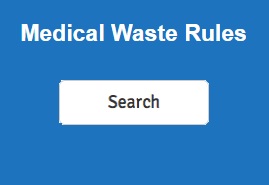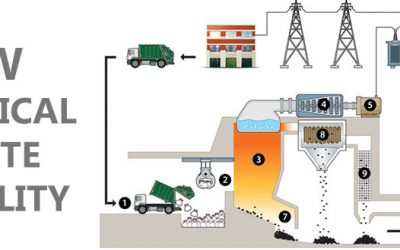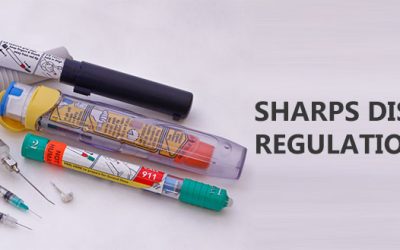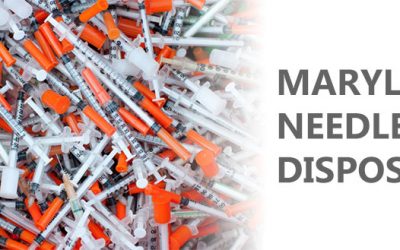Regulated Biohazard Waste Regulations
Medical Waste Disposal | Biohazard Waste Disposal | Sharps Waste Disposal | Biohazard Waste Rules | Regulations | Management By State
Looking for Biohazard disposal regulations in your state?
Biohazard Regulated Waste- An Overview
Biohazard Regulated Medical Waste (RMW) could be known by various names. Call it biohazardous waste, biomedical waste, sharps waste, infectious or clinical medical waste- all of these refer to a portion of healthcare waste that is contaminated with blood, fluids and other infectious elements.
These infectious materials not only pose a great risk of spreading infections in humans but also couldharm the environment. If you search for an exclusive definition of medical waste in the federal laws, do not be surprised to find it vary confusing.
Medical Waste Tracking Act (1988) :
Medical waste turned out to be a big nuisance, washing several beaches on the East Coast of the United States and spreading potential health hazards. As a result, the ‘Medical Waste Tracking Act (MWTA)’ took birth in 1988 and this act was found to be the next level of the previous ‘Solid Waste Disposal Act’.
‘Medical Waste Tracking Act’ of 1988 came forward with the following:
|
|
The US ‘Environmental Protection Agency’ publicized the MWTA regulations in June 1989, but this expired only after a period of 2 years in June1991.
Pharmaceutical Resource Conservation and Recovery Act (RCRA)
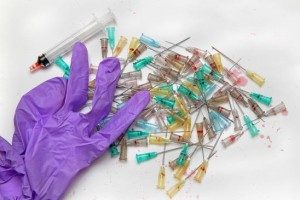
Pharmaceutical waste is also one of the components of hazardous medical wastes and this could contain many active elements that invite dangers. Pharmaceutical waste is generated in a large amount by the healthcare centers and is even found in the regular domestic waste.
‘Pharmaceutical Waste Characterization’is the very first step in theproper management of this waste, with the services of a reliable and dedicated agency to assist you. The process is particularly essential for the chemotherapy agents P-listed and U-listed hazardous wastes.
Our Regulated Biohazard And Medical Waste Management Process:
Do not be surprised to know that the hospitals, veterinary clinics and other healthcare centers ofthe United States generated ‘one million tons’ of medical waste each year.
As per EPA, though most of this waste is potentially harmless (similar to the common household waste), about 15 percent of it could contain lethal infectious elements. Due to this, the medical waste needs appropriate considerations to handle it and dispose of it in a proper manner.
Medical waste, if left in an untreated form, could be a huge menace for the general public and the environment. And you ought to know that each kind of medical waste could pose altogether a different risk.
| Waste generators too could be grouped into two broad groups :
|
Biomedical Waste Treatment And Disposal Methods:
Different companies use different methods to treat biomedical waste before its disposal. And medical waste is mandatory to be turned non-infectious, which is important for the safety and health point of view.
There are various methods for treatment and disposal of biohazardous waste which include the following :
|
|
Biohazard And Sharps Waste :
As per the ‘Medical Waste Tracking Act of 1988’, medical waste is defined as ‘any solid waste that is generated in the diagnosis, treatment, or immunization of human beings or animals, in research pertaining thereto, or in the production or testing of biologicals’.
As per the definition, medical waste could contain elements such as :
|
|
And as already mentioned, different biohazard wastes require distinct methods of treatment. For instance, sharps wastes are highly different than soaked bandages, which calls for distinct treatment needs for both of these.
While all the above information could serve the foundation of the definitions, the exact explanation of medical waste could vary according to the States. Ensure to follow the regulations of your state, to check their proper compliance with the waste disposal program.
Domestic Sharps Needle Waste :
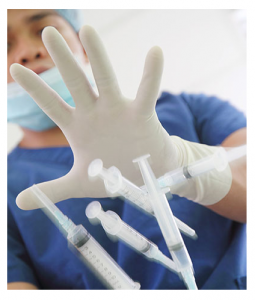
And for storage of sharps wastes, it is essential to get a proper sharps container. Not all the containers you make use of, stand suitable to contain the dangerous sharps wastes. For this, you need to consult a dedicated sharps waste disposal companyand get an appropriate sharps waste disposal container.
The regulations relating sharps wastes too vary a great deal according to the states. While some consider it mandatory to offer the sharps waste to a registered medical waste company only, others are OK with sharps wastes being offered to the regular municipal trash pickup.
Again, ensure to get all the details of proper management of all kinds of medical waste from your state regulations to avoid any sorts of discrepancies in the future.
Syringe Tide :
In 1987-88, the New York, New Jersey and Connecticut region the USA faced an ecological disaster known as the Syringe Tide. Herein, the beaches of these regions saw a whopping content of medical waste, which included raw garbage and hypodermic syringes etc.
This forced the beaches on the Atlantic coast to remain closed, affecting highly the tourism industry of the region.
When traced the sources, officials found it to be a part of Fresh Kills Landfill on the Staten Island. As a result, the New York City was also forced to pay a sum of $1 million for the past pollution damages and cleanup.
Syringe tides also led to the development of an effort called Short-Term Floatable
Action Plan. It has four key elements which are :
• Surveillance
• Regular Cleanups
• Non-Routine Cleanups
• Communication Network
Latest Blog
New Medical Waste Facility
A New Jersey company is looking to build a medical waste treatment and transfer facility in Bristol Township. At the November Bristol Township Planning Commission meeting, Med-Flex Inc. of Hainesport, New Jersey‘s plan to build the facility was approved and forwarded...
Sharps Disposal Regulations
Disposal Of Medical Waste Sharps – Maryland – Virginia – Washington DC Sharps disposal regulations, looking for information on sharps disposal regulations or the proper disposal of sharps, needle and syringe disposal in your State, such as Maryland or Virginia?...
Maryland Needle Disposal
Maryland Needle Disposal, looking for Maryland needle disposal? Here are some quick Dos & Don’ts for needle, sharps disposal and removal in Maryland. Safe disposal for all needles and sharps in Maryland is serious problem and extreme care should be given for the...
